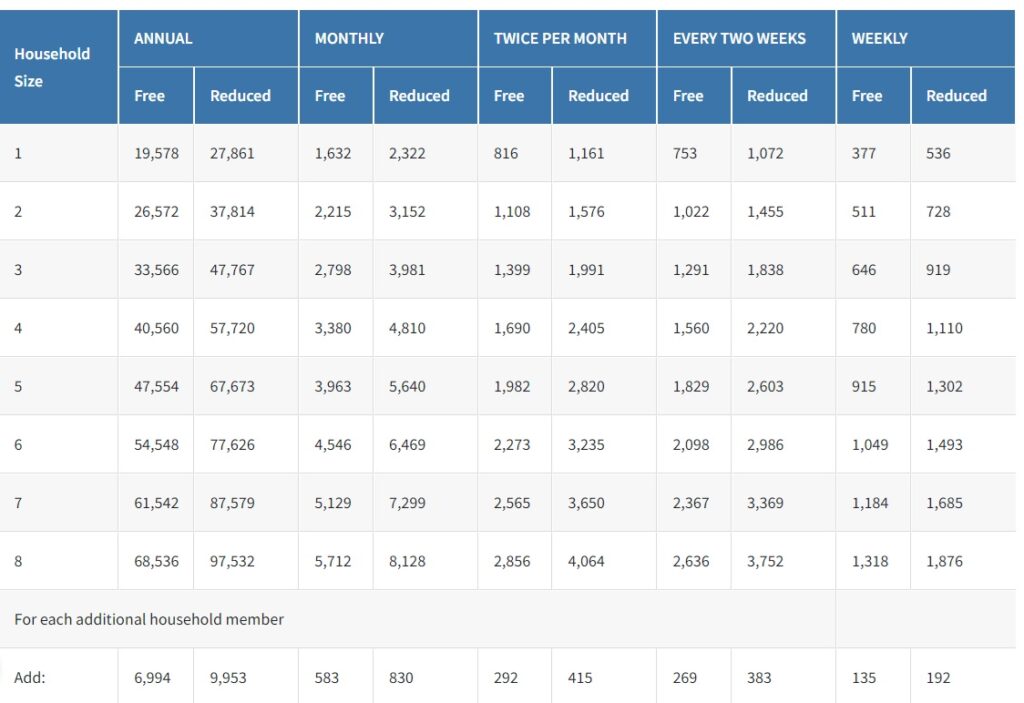
Special to IFN
RALEIGH — The N.C. Department of Public Instruction on Thursday announced the 2024-2025 U.S. Department of Agriculture (USDA) policy for free and reduced-price meals for children enrolled in North Carolina’s schools. The federally assisted school nutrition programs help ensure all students have access to wholesome, nutritious, appealing meals at school.
“Research shows us that access to healthful meals at school can enhance students’ overall health and academic performance,” said State Superintendent Catherine Truitt. “Children who are hungry or poorly nourished have difficulty learning and do not perform as well in the classroom as students who are well nourished. Meals and snacks at school are healthier and more appealing than ever before.”
Healthy meals at school, coupled with a safe, student-focused learning environment, are top priorities in North Carolina because they help prepare students for success.
The federal income eligibility guidelines for July 1, 2024 through June 30, 2025 are shown below:

The household size and income criteria identified above will be used to determine student eligibility for free and reduced-price meal benefits. Children from households whose income is at or below the levels shown in the above chart are eligible for free or reduced-price meals. Children who are members of households that are eligible to receive Supplemental Nutrition Assistance Program (SNAP) benefits or Cash Assistance (CA) are automatically eligible for free meals. SNAP/CA families will be certified by the determining official by direct certification. Foster children who are the legal responsibility of a social services agency or court are considered categorically eligible for free meal benefits regardless of the income of the household with whom they reside.
Applications for free and reduced-price school meals are being made available to all households. Applications should be available in the principal’s office at each school. To apply for free or reduced-price meals, households must complete the application and return it to the school or to the School Nutrition Office within the school district, charter school, non-public school or other institution participating in the National School Lunch Program. The information provided on the household application for free and reduced priced meal benefits will be used to determine student’s eligibility for free or reduced-price meals at school during the school year.
New this year, the application will also be used to determine whether students are eligible to receive Summer – Electronic Benefits Transfer (S-EBT) food assistance during the summer months when school is out of session. Students eligible for free or reduced-price meals are automatically eligible for S-EBT if they are enrolled in a school that participates in the National School Lunch Program on or before May 1 annually. Families receiving FNS or CA do not need to complete a household application because they are automatically certified by the determining official via direct certification; students who are directly certified for meal benefits are also eligible for S-EBT food assistance during the summer.
For school officials to determine eligibility for free and reduced priced benefits, an adult household member must sign the application. Applications must include the names of all household members, the amount and source of income received by each household member and the last four digits of the social security number of the adult household member who signs the application. If the household member signing the application does not have a social security number, he/she must indicate that a social security number is not available. All applications for free and reduced priced meal benefits are subject to verification of income at any time during the school year by school or other program officials.
Under the provisions of the free and reduced-price policy, the School Nutrition Administrator or designee in each school district will review applications and determine eligibility. Parents or guardians dissatisfied with the ruling of the official may wish to discuss the decision with the determining official on an informal basis. Parents wishing to make a formal appeal for a hearing on the decision may make a request either orally or in writing to the school district, charter school, non-public school or other participating institution.
If a household member becomes unemployed or if the household size increases, the household should contact the school. Such changes may qualify children of the household for school meals benefits if the household’s income falls at or below the levels shown above.



